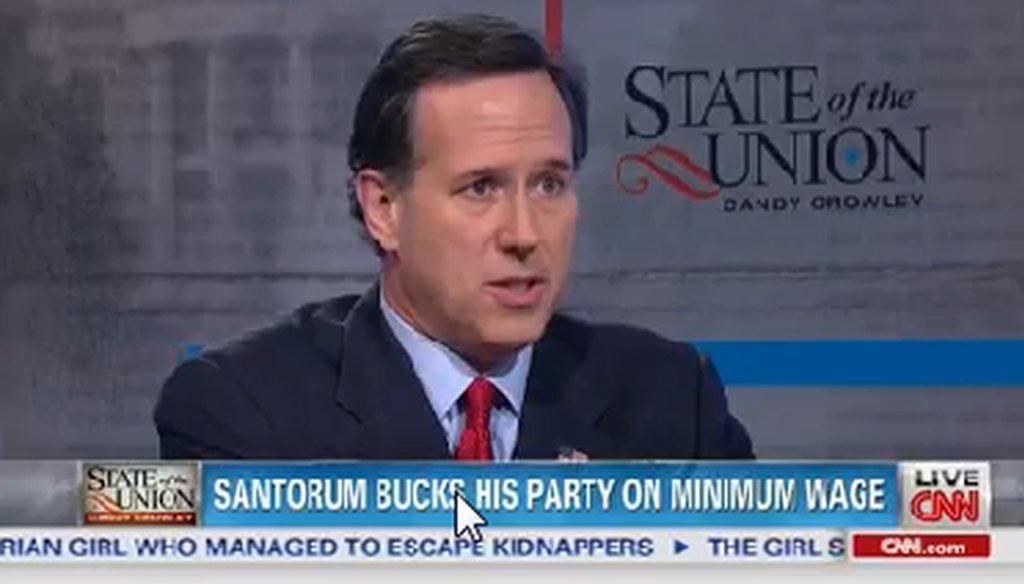Get PolitiFact in your inbox.

Rick Santorum appeared on CNN's "State of the Union" on May 11, 2014.
Fox News pundit George Will doesn’t think much of the #BringOurGirlsBack Twitter campaign to draw attention to the kidnapping of hundreds of schoolgirls in Nigeria.
Appearing on Fox News Sunday, Will called the Twitter hashtag "an exercise in self-esteem."
"I don’t know how adults stand there, facing a camera, and say, ‘Bring back our girls.’ Are these barbarians in the wilds of Nigeria supposed to check their Twitter accounts and say ‘Uh-oh, Michelle Obama is very cross with us, we better change our behavior,’ " Will said.
"Power is the ability to achieve intended effects," Will said. "And this is not intended to have any effect on the real world. It’s a little bit like what environmentalism has become. The incandescent light bulb becomes the enemy. It has no effect whatever on the planet, but it makes people feel good about themselves."
Associated Press reporter Julie Pace went on to explain how the message is meant to raise awareness and encourage governments around the world to act.
At PunditFact, we decided to jump back to Will’s comparison between a Twitter hashtag and the incandescent light bulb, which he said has "no effect whatever on the planet."
That rates False.
The U.S. Energy Department is blunt in its assessment of incandescent bulbs as it has encouraged the use of more efficient alternatives such as compact fluorescent bulbs. (U.S. policy since 2007 has been to phase out incandescent light bulbs.)
"Switching to energy-saving bulbs will reduce the growth of U.S. energy demand and avoid carbon emissions," the department writes on one of its many Web pages on this topic.
When it examined the lifetime energy use of different bulbs, from manufacture to end use, the department found that incandescent bulbs required four times more energy. All things being equal, the need for more electrical power translates into burning more fossil fuels, such as natural gas and coal, which leads to higher greenhouse gas emissions.
The government estimates that if every household got rid of incandescent bulbs, it would reduce greenhouse gas emissions equal to getting rid of 800,000 cars.
That is certainly an effect on the planet.
The closest we could find to an argument that might support Will was a group of scientists in Canada who said the switch to compact fluorescent bulbs might not always have a positive effect in every location. Factors such as the source of power -- hydroelectric, coal, natural gas, nuclear, etc. -- and the balance between the need for heating and air conditioning, could change the outcome from province to province. For example, in British Columbia, greenhouse gas emissions might go up, while in Saskatchewan, they would plummet.
Nevertheless, in total, they still found that emissions dropped using alternative light bulbs.
Will’s claim is "demonstrably untrue," said Neal Elliott, associate research director at the American Council for an Energy Efficient Economy, a research and policy group with representatives from utilities, manufacturers and academia.
Over on CNN’s State of the Union, 2012 Republican presidential candidate Rick Santorum restated his opposition to raising the minimum wage to $10.10 an hour.
The issue, which Democrats continue to push, re-emerged last week when 2012 GOP presidential nominee Mitt Romney said Republicans should agree to the raise the federal minimum wage by nearly $3 an hour.
Santorum advocated for a smaller increase, saying that few people earn the current minimum wage. He also said raising the wage would have negative side effects.
If you raise the minimum wage to $10.10 an hour, "half a million people would lose their jobs," Santorum said, citing a report from the Congressional Budget Office.
Santorum largely quotes a February 2014 Congressional Budget Office report accurately. His statement rates Mostly True.
Obama’s proposed increase would take place in three steps, with the minimum hourly wage hitting $10.10 in 2016. It currently sits at $7.25, but many states choose to pay a higher minimum wage than federal policy mandates.
CBO concluded if the federal government gradually increased the minimum wage to $10.10 an hour for all workers, and tied future increases to inflation, the economy would shed 500,000 jobs by the second half of 2016 (all things constant under current law). That’s about 0.3 percent of the workforce. CBO reached its conclusion figuring that higher wages increase companies’ production costs, which lowers the amount of goods and services produced. That means companies need to employ fewer workers.
While Santorum said 500,000 people "would lose their jobs," that’s just an estimate. CBO said job losses could range from hardly any, all the way up to 1 million.
The CBO report isn’t all bad news for people who want the minimum wage increased. The same study found that 16.5 million Americans would see pay hikes if the minimum wage was raised to $10.10 an hour.
Jon Greenberg and Julie Kliegman contributed to this report. Aaron Sharockman is the editor of PunditFact.com.
Our Sources
See individual fact-checks.
































